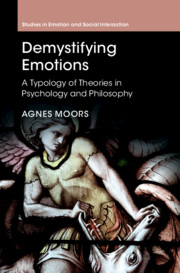Book contents
- Demystifying Emotions
- Studies in Emotion and Social Interaction
- Demystifying Emotions
- Copyright page
- Contents
- Figures
- Tables
- Boxes
- Preface
- Acknowledgment
- Abbreviations
- Part I Introduction
- Part II Emotion Theories One by One
- Chapter 3 General Precursors
- Chapter 4 Evolutionary Theories
- Chapter 5 Network Theories
- Chapter 6 Stimulus Evaluation Theories
- Chapter 7 Response Evaluation Theories
- Chapter 8 Psychological Constructionist Theories
- Chapter 9 Social Theories
- Part III Conclusion
- References
- Index
- Titles Published in the Second Series (continued from page ii)
Chapter 3 - General Precursors
from Part II - Emotion Theories One by One
Published online by Cambridge University Press: 11 August 2022
- Demystifying Emotions
- Studies in Emotion and Social Interaction
- Demystifying Emotions
- Copyright page
- Contents
- Figures
- Tables
- Boxes
- Preface
- Acknowledgment
- Abbreviations
- Part I Introduction
- Part II Emotion Theories One by One
- Chapter 3 General Precursors
- Chapter 4 Evolutionary Theories
- Chapter 5 Network Theories
- Chapter 6 Stimulus Evaluation Theories
- Chapter 7 Response Evaluation Theories
- Chapter 8 Psychological Constructionist Theories
- Chapter 9 Social Theories
- Part III Conclusion
- References
- Index
- Titles Published in the Second Series (continued from page ii)
Summary
This chapter discussed the general precursors of the families of emotion theories to be discussed in the ensuing chapters: Darwin (1872) and James (1890b). Darwin (1872) proposed an evolutionary and eventually also a mechanistic explanation for emotional behavior, particular facial expressions. Initially goal-directed processes grow into habits (learned emotion-response links) and instincts (innate emotion-response links). Today these instincts are no longer of use, which is why they appear in weakened form as facial expressions. James (1890b), seeking a causal-mechanistic explanation for emotions themselves, proposed that stimuli activate instincts (innate stimulus-response links) and habits (learned stimulus-response links), which when enacted produce somatosensory feedback, felt as emotions. James’s (1872) theory accounted for the properties of ontogenetic and phylogenetic continuity, phenomenality, bodily aspect, heat, control precedence, and irrationality, but has difficulty delivering the right kind of (world-directed) Intentionality, and even the right kind of heat. James (1872) rejects partitioning the set of emotions into discrete subsets. Empirical evidence pro and contra James’s (1872) theory is discussed.
Information
- Type
- Chapter
- Information
- Demystifying EmotionsA Typology of Theories in Psychology and Philosophy, pp. 91 - 112Publisher: Cambridge University PressPrint publication year: 2022
